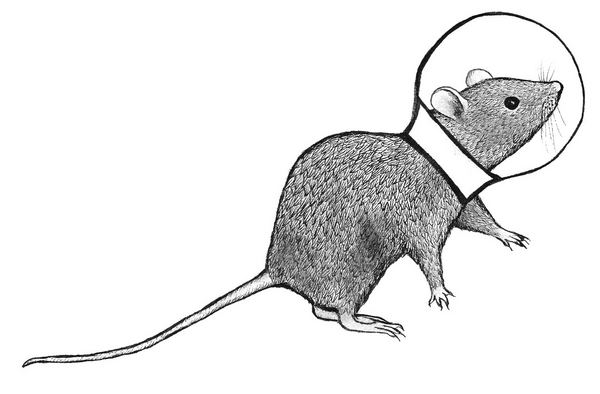In space, the bone density of both the human astronauts and rodent variety decreases. Scientists published this study on April 19th, 2023, in the journal Cell Reports. It says that alterations to the gut microbiomes of space travelers may be linked to this bone loss.

Illustration of a rodent wearing a space helmet. Image Credit: Liana Wait
Rodents that spent a month or more on the International Space Station had changed, and more variety of microbiomes and the bacterial species that flourished in space might have added up to the increased generation of molecules that are known to impact the bone remodeling process.
This is just another vivid example showing the dynamic interactions between the microbiome and mammalian hosts. The gut microbiome is constantly monitoring and reacting, and that’s also the case when you're exposed to microgravity. We’ve yet to find out whether there’s a causal link between changes to the microbiome and the observed bone loss in microgravity and if it is simply a consequence or an active compensation to mitigate, but the data are encouraging and create new avenues for exploration.”
Wenyuan Shi, Senior Author, Microbiologist and Chief Executive Officer, Forsyth Institute
Human bones are not static; even when they are completely developed, the material is constantly being removed, added, and transferred around in a process known as bone remodeling. New research has proposed that gut microbes may affect bone remodeling through different mechanisms that include communications with the immune and hormonal systems.
Microbes also produce different molecules due to their own metabolism, and a few of these metabolites indirectly communicate with the cells that are accountable for bone remodeling.
The microbiome can be affected by space travel for various reasons.
First and foremost, there are the physical forces at play, such as microgravity and cosmic radiation exposure, which affect not only the bacterial cells but also the human cells. Likewise, there are numerous resulting effects on host biological systems from microgravity exposure—immune system irregularities, musculoskeletal changes, altered circadian rhythm, stress—and when those systems become imbalanced, the microbial communities potentially could be disrupted, too.”
Joseph K. Bedree, Study First Author and Microbiologist, Forsyth Institute
To discover how the microbiome alters at the time of prolonged exposure to microgravity, and to examine likely links between these changes and bone density, the scientists sent 20 rodents to the International Space Station. After 4.5 weeks, ten of these rodents came back alive to Earth, and the scientists tracked how their microbiomes recovered on returning.
The other 10 space rodents stayed in orbit for a total of 9 weeks. Twenty “ground control” rodents were accommodated in similar environments—although except the microgravity—on Earth. The team defined and compared the microbial communities for the varied groups over time: before launching into space, after returning to Earth, and at end of the study. Also, they assessed alteration in serum metabolites for the space rodents that were exposed to microgravity for the complete 9 weeks.
This is the first time in NASA history that a rodent has been returned to Earth alive. This meant we were able to gather information about the change in space, and then monitor their microbiome’s recovery when they returned. The good news is that even though the microbiome changes in space, these alterations don’t appear to persist upon returning to Earth.”
Wenyuan Shi, Senior Author, Microbiologist and Chief Executive Officer, Forsyth Institute
The team found that the space rodents had more varied gut microbiomes when compared and characterized the gut microbiomes of the space and ground control rodents. Two kinds of bacteria—Lactobacillus and Dorea species—were much more abundant in microgravity-exposed rodents, and their abundance was even higher in rodents who spent 9 weeks in space when compared to the one who spent 4.5 weeks.
These two bacteria’s metabolism also could have added up to the higher metabolites that were found and linked to microgravity exposure.
“When we mapped the genetic pathways for Lactobacillus and Dorea, they seemed to line up with the metabolites that were elevated during microgravity exposure. When someone’s in microgravity and experiencing bone loss, it would make sense that their body would try to compensate and that the biological systems within would be doing that as well, but we need to do more mechanistic studies to truly validate these hypotheses,” adds Bedree.
One non-microgravity aspect that might have driven the rodents’ altering microbiome in space is that they could not engage in coprophagy, a typical rodent behavior whereby they consume their own feces, which reinstates microbes back into the gut. Nevertheless, the rodents that came back from space after 4.5 weeks could engage in coprophagy after return, and this might have added up to their recovery of microbiomes.
As this research shows insights into how the microbiome alters at the time of space travel, the authors say that much research is needed to comprehend the likely association between bone density and microbiomes. They plan to pursue research on Earth.
If one could guess which microbes aid in bone density maintenance, it could help astronauts stay healthier in space. The scientists state this data could also assist people back on Earth who go through bone loss due to non-gravity-related reasons. “This could potentially lead to new tools for managing diseases like osteopenia or osteoporosis, so it's not just an isolated story in space,” concludes Shi.
Source:
Journal reference:
Bedree. J. K. et al. (2023) Specific host metabolite and gut microbiome alterations are associated with bone loss during spaceflight. Cell Reports. doi.org/10.1016/j.celrep.2023.112299.